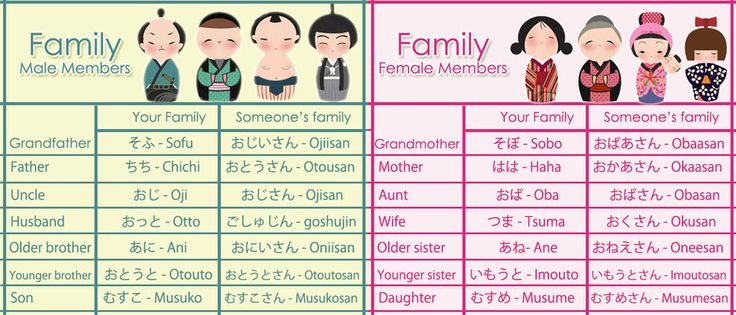When talking about family members, there are two different ways of addressing them. One of them is when talking about your own family members to other people, and the other one is when mentioning someone else’s family members. Changing the words like this shows respect towards other’s family members while familiarising yourself with your own. Japanese pay respect (尊敬 – そんけい sonkei) to other people when mentioning someone’s family members. Therefore if they have to mention someone’s family members in a conversation, they will address them with the words that are more respectful for the Japanese family members.
| Talking about your family | Talking about another’s family | |
|---|---|---|
| father | chichi 父 | otousan お父さん |
| mother | haha 母 | okaasan お母さん |
| older brother | ani 兄 | oniisan お兄さん |
| older sister | ane 姉 | oneesan お姉さん |
| younger brother | otouto 弟 | otoutosan 弟さん |
| younger sister | imouto 妹 | imoutosan 妹さん |
| grandfather | sofu 祖父 | ojiisan おじいさん |
| grandmother | sobo 祖母 | obaasan おばあさん |
| uncle | oji 叔父/伯父 | ojisan おじさん |
| aunt | oba 叔母/伯母 | obasan おばさん |
| husband | otto 夫 | goshujin ご主人 |
| wife | tsuma 妻 | okusan 奥さん |
| son | musuko 息子 | musukosan 息子さん |
| daughter | musume 娘 | ojousan お嬢さん |
Basic Family Members in Japanese
The following video will run through the pronunciation and simple spelling of a small family unit including a mother, father and older/younger brothers and sisters.


